“Detoxing” is a term we hear more and more frequently these days, especially when looking for ways to get healthy. But what is detoxing? What are toxins? Should we even be worried about toxins? How long does it take to detoxify? In this article we will explore the world of detox and get some answers.
What are toxins?
Toxins are any substance that causes harm to an organism. We are exposed to a variety of toxins every day, some natural, but many human-made. For example, the Environmental Protection Agency has information on about 200 of the 3800 chemicals present in consumer products, and safety research has not been performed on 90% of the 1300 chemicals in cosmetics. The average woman has skin contact with 162 chemicals a day, in her personal care products alone. There are many additional exposures with pesticides, herbicides, steroid hormones and antibiotics in conventionally grown foods. Industrial processes, agricultural chemical run-off, and air pollution are additional sources of pollution. This is the unfortunate reality of living in North America, and we are relatively lucky, as other areas of the world have even less regulation, oversight, and cleanup then we do. Once we become aware of the virtual sea of chemicals that surrounds us, it can be overwhelming.
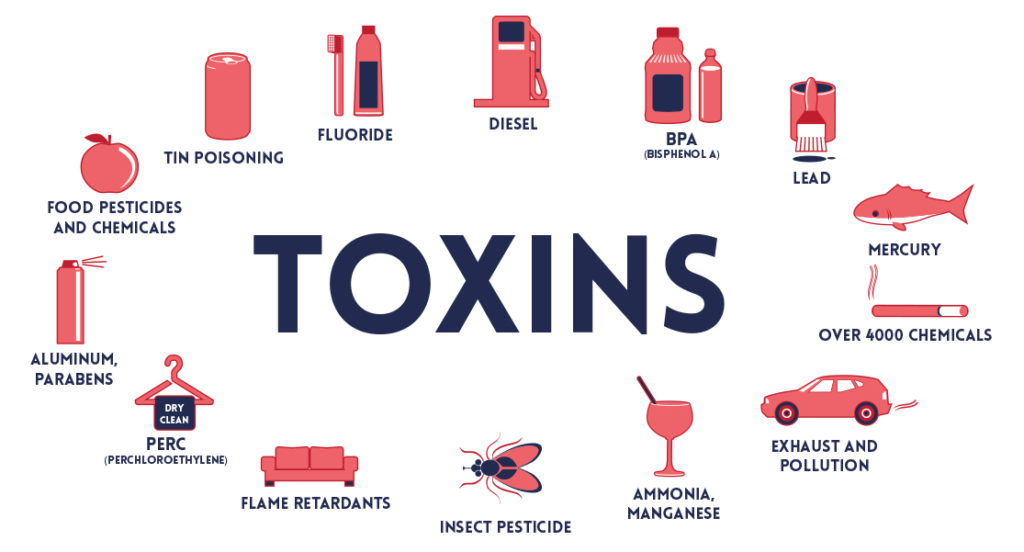
In addition to these physical toxins, daily life brings many sources of emotional and spiritual toxins which produce pro-inflammatory mediators, and/or stress hormones which may suppress the immune system. Chronic negative stress from any source, such as financial worry, dysfunctional relationships, a history of abuse or trauma, political unrest, can trigger disease and dysfunction.
What is Detoxification?
Detoxification takes place primarily in the liver/digestive system and the kidneys, as well as in the lungs and skin. Orally ingested toxins are absorbed and sent to the liver for “first pass metabolism”. Other toxins, produced within the body, are also sent to the liver with every heart beat. Here, toxins undergo “Phase 1” detoxification, in which they are made water-soluble, and “Phase 2” detoxification, in which they are neutralized and sent to the digestive tract via bile, or to the kidneys, for excretion. Volatile substances are also exhaled via the lungs, including a major toxin, carbon dioxide. The lungs’ alveoli are lined with white blood cells that tackle airborne pollutants when inhaled. The skin is an organ as well, and stands as a first line of defence for physical contact with toxins, as well as producing sweat, and improving circulation by opening micro vessels. Just below the skin lies the lymphatic system, carrying waste products of all kinds back from the extremities for removal via the liver.
How Long Should We Detox?
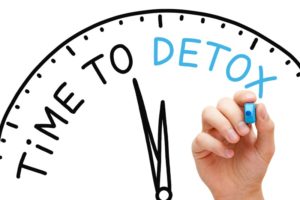
There are few objective ways to measure detoxification. Commonly, detoxing is dismissed, especially by the medical community, as unnecessary. Our organs of detoxification (the liver, the digestive system, the kidneys and the skin) are assumed to be up to the task. However, research evaluating the number of chemicals present in sample populations has found 200 chemicals in umbilical cords of newborns, 16 hormone-disruptors in young women, 162 chemicals in children etc. Many organic chemical compounds are persistent in the body, meaning that they resist detoxification by normal methods. In addition, our methods for measuring damage from toxic substances are inadequate, relying on crude measurements like elevated liver enzymes from frank liver damage, or kidney damage measurements, or circulating blood levels of mercury or lead. Our medical community’s education and training does not, for the most part, cover environmental causes of disease, and the body is studied in isolation from its environment. Therefore, the impact of the environment on our organs of detoxification is not measured or valued.
On the other hand, the word “toxin” is overused, and it is easy to feel that we must be constantly purging in order to deal with this toxic burden. Detoxification requires a great deal of metabolic energy and nutrients, and one can become depleted if we focus only on detoxification. Instead, by supporting the natural processes of detoxification, doing periodic detox protocols, and more importantly, by avoiding toxins in the first place, we can be confident we have given our bodies their best chance of avoiding diseases and conditions due to toxicity.
The question of how long it takes to detoxify is therefore clinically determined by a reduction in symptoms and disease processes. Short term detoxes are unlikely to make much impact on overall health, and the longer one has been unwell, the longer it will take for the overburdened organs of detoxification to do their natural jobs. For many people, symptoms will take at least 3 weeks to disappear, and many chronically ill people need 3-6 months of detoxification to see real results.
Instead of seeing “detox” as something to be done for 10 days, incorporate detoxification habits into your daily life. Eat a healthy, chemical-free diet, focused on whole foods that support detox. Support your liver and kidneys with herbs and supplements (under professional guidance). Drink enough water to keep your urine pale or clear. Avoid alcohol, tobacco, and drugs, including pharmaceuticals if alternatives can be found. Choose personal care products and household products that are non-toxic and environmentally-friendly. Avoid commercial pesticides, herbicides, and fertilizers. Reduce the use of volatile organic compounds in paints and home repairs. Rid yourself of toxic emotions, situations and relationships. Advocate for a healthier environment, both locally and globally. Work on your stress level. Get regular sleep and exercise. These habits, performed over years, rather than days, will support our own natural ability to detox and lower our toxic load.
About the author
Dr. Rebecca is a Naturopathic Doctor at Angel Hands Integrative Centre who has been practicing Natural Medicine for many years. If you have any further questions, she can be reached for consult at 604 558 1926 or email
[email protected]
.
Find out more about Dr. Rebecca
here
.

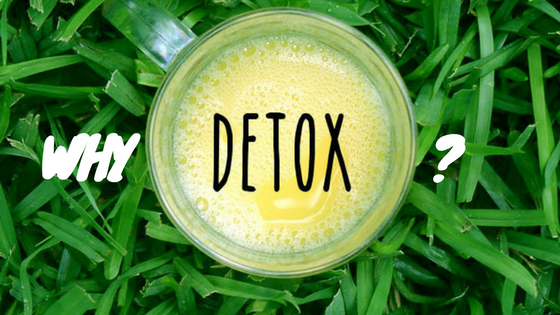
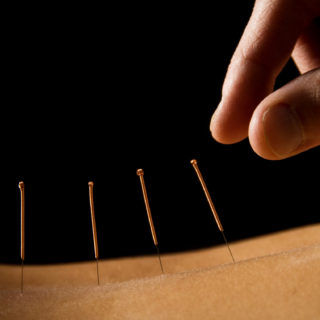









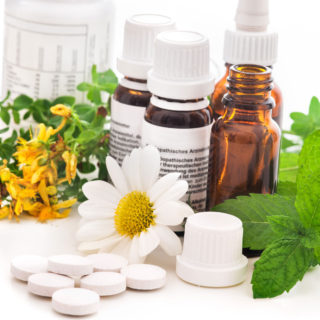






No Comments
Be the first to start a conversation